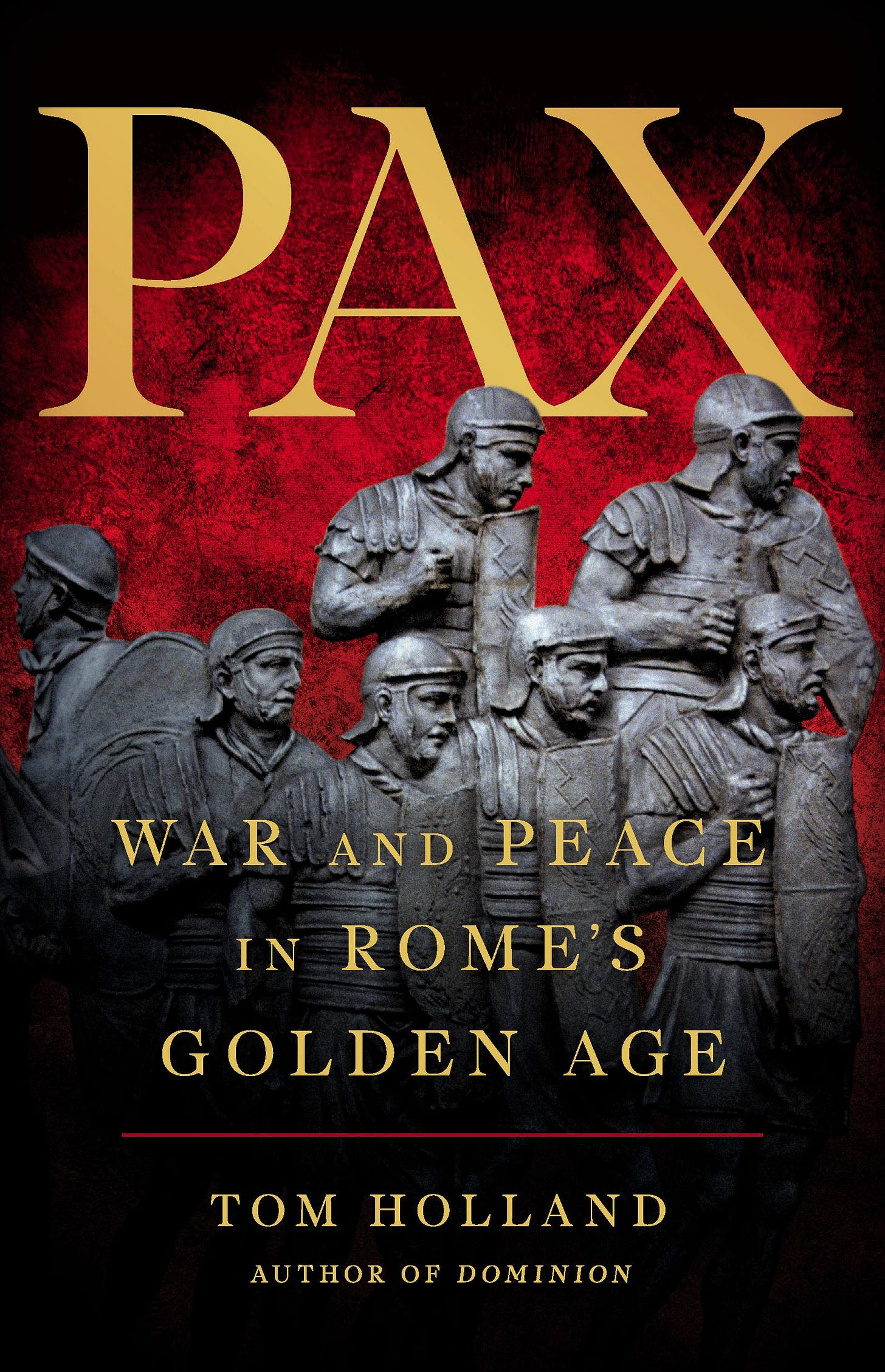Book Review: "Pax: War and Peace in Rome’s Golden Age"
Tom Holland's new book is a fascinating, bloody, and richly-told story of the glories, and darkness, of the Pax Romana.
I have what you might call a conflicted relationship with the works of the historian Tom Holland. While I find his books quite compelling to read, he has a few rhetorical tics that start to get old after a while, particularly once you read several of his books in succession. His approach to narrative history can also, at times, be a bit slippery, and it be difficult sometimes–even for those, like me, who know quite a bit about antiquity–to see where he’s replicating the prejudices and strangeness of the ancients and when he is narrating something that actually happened.
Nevertheless, I continue to gobble them up the moment they come out and, thanks to NetGalley, I was able to procure an ARC of Pax: War and Peace in Rome’s Golden Age. Starting with the demise of the Emperor Nero and the subsequent chaos of the Year of the Four Emperors (in 69 CE) and running until the death of the Emperor Hadrian (in 138 CE), it’s a sweeping, bloody, libidinous history and a rousing good time. As has always been the case with Holland, he has a keen eye for how to make history into a narrative that sweeps you along in its wake.
As we read about the Year of the Four Emperors, for example, he gives us a deep dive into the lives, loves, and misdeeds of both Nero himself–who, among other things, married a boy named Sporus after he had him gelded–and those who fought over the throne he left behind. Galba, Otho, Vitellius, and Vespasian emerge from these pages as true larger-than-life personalities, men driven by a combination of greed, lust for power and, in the case of Vespasian at least, some bit of nobility. Likewise, Titus is a playboy but genuinely is an effective if short-lived ruler, just as his brother, Domitian, is a thoroughly competent but debilitatingly paranoid autocrat.
Likewise, Nerva, Trajan, and Hadrian are all, in their own ways, responsible for the Pax Romana. Nerva, because he was able to restore the Empire to stability after the dangerous last years of Domitian; Trajan because he was a true military genius, able to stretch the bounds of the Empire into new realms; and Hadrian because, recognizing the limits of imperial power, he pulled back the boundaries to sustainable levels. Each of them becomes, in Holland’s capable hands, men of flesh-and-blood, rather than simply stereotypes or cold marble statues.
This isn’t to say that Pax doesn’t also draw our attention to the marginalized. Like any good storyteller, Holland knows that a truly comprehensive history of Roman might must also pay attention to those who didn’t occupy the higher echelons of society and power. To this end, he draws our attention to the lives of soldiers and slaves and numerous others, both in Rome but also on the frontiers. In doing so, he gives us a sense of what it might have been like to live in those times, whether it was during the tumult of political crisis or during the eruption of a city-destroying volcano. The portions of the book detailing the explosion of Vesuvius–which buried Pompeii and Herculaneum–are particularly vivid. One almost feels as if one’s watching a film.
Pax also demonstrates the extent to which the Roman peace was, paradoxically, the result of significant armed conflict. The Romans were never ones to accept that there might be those around the Mediterranean Sea and its environs that might not want to bend their necks to the yoke, and they tended to respond to revolts with significant violence. This was as true in Dacia as it was in Jerusalem, and Holland pays particular attention to Trajan’s Dacian War and the siege of Jerusalem conducted by both Vespasian and his son Titus. As with the sequences dealing with Vesuvius, these unfold almost cinematically, such is Holland’s command of the story.
Overall, I very much enjoyed Pax. I’m not sure that I learned anything new, necessarily, but it’s always a pleasure to read Holland. Moreover, as he points out in his introduction, he has no interest in drawing similarities between the Romans and those of us in the present. If there’s one thing that allows this book to stand out, it’s its resolute willingness to treat the Romans as the strangers that they are. Given the extent to which everyone seems to want to see themselves reflected in the mirror of antiquity, this is a very remarkable approach, indeed.





"...he has a few rhetorical tics that start to get old after a while" ...or does he...?